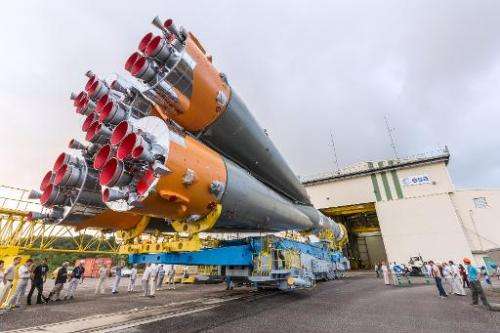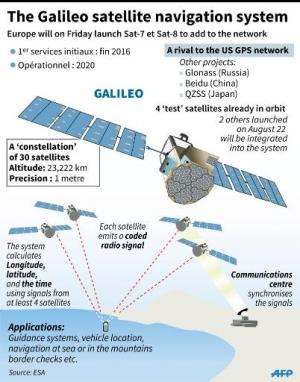Europe poised to launch navigation satellites after mishap

Europe was set to launch two navigation satellites Friday for its rival to America's GPS, the first additions to the Galileo constellation since a technical mishap misdirected two orbiters last year.
Galileo's seventh and eighth satellites are set to lift off from Europe's spaceport in Kourou, French Guiana, at 2146 GMT (6:46 pm local time) on a Russian Soyuz rocket—the same type that malfunctioned last August.
"We are fully ready for the launch tonight," Galileo programme director Didier Faivre told journalists in a conference call from Kourou nine hours before liftoff.
The mission should last three hours and 47 minutes in total—it will take nine minutes to cast off the first three stages of the rocket before the fourth continues on its own steam.
The multi-billion-euro satellite navigation and search and rescue system will ultimately consist of 30 orbiters, and is set to become fully operational by 2020.
But it has encountered a long series of technical hitches, delays and budget questions.
Friday's launch had originally been scheduled for December last year, but was suspended pending a probe into the August 22 mislaunch which left satellites five and six in an incorrect orbit.
They should have been slotted into a circular trajectory at an altitude of 23,500 kilometres (14,600 miles), inclined at 56 degrees to the equator. Instead, they were placed in an elliptical orbit that saw them travelling as high as 25,900 km above Earth and to a low point of 13,713 km, not useful for navigation.

Both have since been manoeuvred into a better, more circular trajectory, but it was not yet clear whether they will ultimately form a useful part of the satnav programme.
The hitch was blamed on frozen fuel pipes on board the Soyuz rocket's fourth stage, called Fregat.
Pipes containing hydrazine propellant had been placed too close to super-cold helium feed lines, investigators reported—a problem the European Space Agency (ESA) says has since been fixed.
The new satellite pair are to be launched to an altitude of 23,522 kilometres, before lowering themselves into their "working" orbit at 23,222 km.
They should become operational by mid-year after in-orbit testing.
Faivre said there should be another Soyuz launch in September, followed by another "at the very end of the year, or the very beginning of 2016".
"The idea is to have six satellites per year," he said.
The European Commission, which finances the project, hopes to have 16 satellites in orbit by end-2016 to start providing early services.
The remaining satellites will be launched using a combination of Russian Soyuz rockets, which can take two aloft at a time, and Europe's Ariane 5 ES launcher, which can handle four.
Contracts have been signed for five Soyuz launches and three with Ariane 5 ES.
The Galileo satellites have yet to pass compatability tests for launch on Ariane.
A Soyuz lifted four satellites for Internet data provider O3b last December—successful despite a worrying break in communication.
Five billion euros ($5.4 billion) were spent on Galileo up to 2014, and a budget of another seven billion euros has been approved until 2020.
Unlike the US GPS and Russia's Glonass satnav programmes, Galileo will be under civilian control. It will be inter-operable with the other two, and is intended to provide better coverage of northern Europe and to be more precise.
© 2015 AFP



















